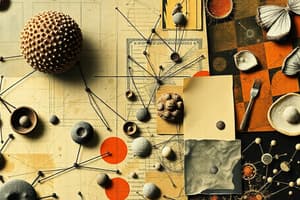Podcast
Questions and Answers
What is the primary purpose of biomimetics in engineering?
What is the primary purpose of biomimetics in engineering?
The primary purpose of biomimetics is to mimic biological systems to solve complex human problems.
How do superhydrophobic surfaces in engineering applications draw inspiration from nature?
How do superhydrophobic surfaces in engineering applications draw inspiration from nature?
Superhydrophobic surfaces are inspired by lotus leaves, which repel water effectively due to their unique structures.
Describe the design features of the no pain needle and how they contribute to its function.
Describe the design features of the no pain needle and how they contribute to its function.
The no pain needle features a jagged shape with serrated shanks and a central shaft to minimize pain during injections.
What role does bioinspiration play in the development of self-healing concrete?
What role does bioinspiration play in the development of self-healing concrete?
Explain the difference between bionics and biomimetics.
Explain the difference between bionics and biomimetics.
Flashcards
Bionics
Bionics
The development of a modern system or set of functions based on a similar system that exists in nature.
Biomimetics
Biomimetics
The process of mimicking the formation, structure, or function of a naturally produced substance or material to create an artificial product.
Superhydrophobic
Superhydrophobic
A surface that repels water due to its extreme non-wetting properties.
Self-Healing Concrete
Self-Healing Concrete
Signup and view all the flashcards
Bio-Inspired Muscles
Bio-Inspired Muscles
Signup and view all the flashcards
Study Notes
Course Objectives
- Understand the basic organization of various biological systems
- Critically analyze, apply, and translate engineering perspectives
Bioinspired Concepts
- Bionics: Developing modern systems or functions based on similar systems found in nature
- Biomimetics: Mimicking the formation, structure, or function of biologically produced substances to create artificial products
Tapping into Nature
- Bioinspiration draws inspiration from natural systems
- Many solutions to engineering problems are inspired by biological phenomena
Superhydrophobic Lotus Leaves
- Lotus leaves have a unique, water-repelling surface structure
- This structure is composed of nano-waxy hydrophobic materials
- The microprotrusions on the surface create a water-repellent effect
Biomimicry Example: Threadsmiths Hydrophobic T-Shirt
- Biomimicking the lotus leaf's water-repellent properties, hydrophobic clothing is developed
- Inspired by the lotus leaf's superhydrophobic property
Lotusan Biomimicry Paint
- This paint mimics the natural water-repelling properties
- The image shows how water droplets roll off the coated surface
Water Strider - Gerris remigis
- Water striders effortlessly stand and row on the water's surface
- Their legs have dense hairs that prevent wetting
- These hairs create a hydrophobic effect, and the legs rest on depressions in the surface film
No Pain Needles
- Microneedle injection device inspired by insect anatomy
- One-millimeter needles with 0.1mm diameter
- Silicon dioxide etched into a jagged shape
- Two serrated shanks create an injection/withdrawal effect
- Connected to a reservoir with an optical sensor
Self-Healing Concrete
- Concrete structures weaken before their lifespan ends
- Traditional concrete has a flaw under tension
- Bacteria ( Bacillus Pseudofirmus) are mixed with concrete
- Cracks allow water to enter and activate the bacteria
- Bacteria produce limestone that fills the cracks
Bullet Trains Inspired by Kingfisher Birds
- Japanese engineers modified bullet trains, inspired by Kingfisher birds (reducing noise)
- The new beak-shaped nose minimized tunnel boom
- The new design reduced electricity consumption and improved speeds
Shark Skin Inspired Surfaces
- Sharklet™ antibacterial surface
- Speedo fastskin swimsuit (biomimicking shark skin for swimming)
Bio-inspired by Muscles
- Artificial muscles can grip, lift, and twist objects
- Inspired by biological muscle mechanisms (e.g., birds, animals etc)
Biomimicry
- Biomimetics (or biomimicry) is the imitation of nature's models, systems, and elements to solve complex human problems
Studying That Suits You
Use AI to generate personalized quizzes and flashcards to suit your learning preferences.




